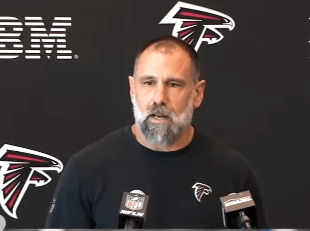Jeff Ulbrich has risen through the NFL coaching ranks thanks to his strategic leadership, deft defensive planning, and reputation for holding players to exceptionally high standards. That narrative is further supported by his appointment as defensive coordinator for the Atlanta Falcons prior to the 2025 season, particularly in light of his $1.6 million yearly salary. With that number, he ranks ninth among NFL defensive coordinators, only behind well-known figures like Mike Zimmer of the Cowboys and Steve Spagnuolo of the Chiefs.

Ulbrich’s pay may seem low by NFL standards, but the highest-paid defensive coordinator right now, Vic Fangio, is making $4.5 million with the Eagles. Nevertheless, Ulbrich’s pay is very competitive, especially given that he left the New York Jets, where he was interim head coach for a brief period in addition to being defensive coordinator.
| Attribute | Details |
|---|---|
| Full Name | Jeffrey Michael Ulbrich |
| Date of Birth | February 17, 1977 |
| Nationality | American |
| Current Role | Defensive Coordinator |
| Team | Atlanta Falcons |
| Salary (2025) | $1.6 million per year |
| Net Worth (2024) | Estimated $10 million |
| Past Coaching Role | Defensive Coordinator, New York Jets |
| Playing Career | San Francisco 49ers (2000–2009) |
| Public Recognition | Top 10 highest-paid DC in NFL |
| Source | https://frontofficesports.com |
Raheem Morris, the Falcons’ head coach, viewed his move as especially calculated because he wants to revitalize the team’s defense through discipline and reliable play. Aggression, pressure, and structured adaptability are key components of Ulbrich’s system, which Falcons supporters hope will translate into postseason relevance.
However, Ulbrich has been in the news lately for reasons completely unrelated to his playbook. An incident involving his son, Jax Ulbrich, during the 2025 NFL Draft turned out to be surprisingly costly. Jax used a confidential contact list that was distributed during the draft to prank call Colorado quarterback Shedeur Sanders after he managed to get access to his father’s iPad. Once the call was tracked down, it swiftly became a public humiliation. Both Penn State TE Tyler Warren and Browns DT Mason Graham received similar prank calls.
Despite the fact that a minor made the calls, the NFL took the situation very seriously. The Falcons organization was fined $250,000 for failing to protect sensitive player data, and Ulbrich was fined $100,000 personally. Ulbrich’s annual income was immediately reduced by more than 6% as a result of that one error, which taught him a painful lesson about professional boundaries and digital privacy, particularly during the crucial NFL Draft period.
In league circles, this incident brought up significant issues. With tech-savvy kids and more connected devices lurking behind the scenes, how are teams handling internal cybersecurity? The stakes are particularly high for an industry that depends so heavily on timing and secrecy.
Beyond the news, Ulbrich’s career path is similar to that of other former athletes who made the unexpected move to coaching. Similar to DeMeco Ryans, who went from linebacker to head coach of the Texans in a flash, Ulbrich has had an exceptionally successful transition from playing for the 49ers to managing intricate NFL defenses. His discipline as a linebacker on the field has translated into a calm, incisive coaching style, which Falcons management obviously appreciated.
Notably, Ulbrich receives compensation from sources other than his coaching contract. He has amassed an estimated $10 million in net worth over the years through wise saving during his playing career, small endorsement deals, and well-timed real estate investments. Ulbrich’s more subdued approach to financial longevity is especially commendable, even though he is not as commercially visible as former players who went into broadcasting, such as Jason Witten or Tony Romo.
The Falcons defense has reportedly been energized by his coaching style, which is based on calculated aggression and skillful play-calling. He has started to change Atlanta’s defensive culture by utilizing his relationships with former teammates and nurturing up-and-coming talent. This strategy is in line with league-wide patterns that show defensive coordinators are becoming more and more acknowledged as influential figures in franchise development.
For instance, Steve Wilks. His 2023 midseason turnaround efforts for the 49ers established a standard for the impact that a competent coordinator can have. In a similar vein, Dan Quinn’s time with the Cowboys demonstrated how defensive leadership can propel whole stories—and postseason success.
Ulbrich’s fine has elicited mixed reactions from the public. Given that his child was involved in the incident, some fans believe the NFL’s response was excessively harsh. Others contend that secrecy must be upheld at all costs, particularly during draft proceedings when scouts, agents, and families are using secure data to make decisions that could change their lives. Discussions about striking a balance between work and family obligations have also been rekindled by the incident, especially for positions requiring continuous digital connectivity.
Ulbrich was never one to seek attention while he was playing. He was a tackling linebacker with a tough attitude who spent ten seasons with the 49ers. Notably, his coaching identity has reflected that blue-collar ethic. His former teammates frequently characterize him as being especially grounded and more concerned with discipline and preparation than with publicity.
Ulbrich’s $1.6 million signing with the Falcons was seen as a calculated strategic move that provided both cost effectiveness and seasoned leadership. The agreement itself serves as a declaration of intent: an investment in stability and vision rather than just schemes. However, the penalty he was given also serves as a warning about the increasingly difficult boundaries that NFL coaches face in the digital age.
Even though Jeff Ulbrich’s pay may not be at the top of the league charts, his story shows how pay relates to accountability, public scrutiny, and changing team dynamics. It also draws attention to the NFL’s larger change, as coordinators—especially on the defensive end—are taking on bigger, more visible responsibilities and forming team identities in ways that head coaches used to be the only ones able to do.
All eyes will be on Atlanta’s defense and Ulbrich’s system’s ability to function under duress as the 2025 NFL season draws near. Red zone plays, third-down conversions, and his players’ reactions to his calls under the stadium lights will be the real indicators of his $1.6 million salary, not news stories or scandals.
